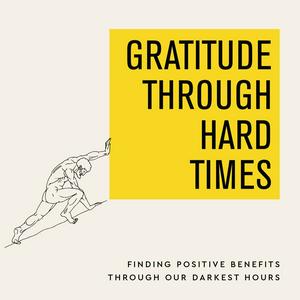"You’re going to be okay." These five simple words from a 98-year-old grandmother became the cornerstone of a leadership philosophy that has driven over $20 billion in revenue influence.
In this episode of Gratitude Through Hard Times, Chris Shambra sits down with Sandy Hogan—a powerhouse revenue leader who has held the helm at tech giants like Cisco, Rackspace, VMware, and LivePerson. But this isn't a conversation about go-to-market strategies or revenue multiples. This is a deep dive into the "Graceful Disruption" of the self.
Sandy shares her incredibly raw journey from a childhood as the daughter of Yugoslavian immigrants to a mid-career health crisis that forced her to "bet on herself." We explore how resilience isn't just a buzzword, but a protective layer formed in the fires of hard work and immigrant sacrifice.
10 Memorable Quotes:
"It’s a protective layer, not a punitive layer that’s unfolding."
"You can get through anything your heart and mind determines you truly can."
"Progress is the touchdown."
"Work ethic and your attitude. Everything falls into place, never perfectly, but those two are everything."
"I didn't control the circumstances around me, but I choose every day what I do about it."
"Trust is a little overused and undervalued. It has to be earned."
"Mindset leads, always—as a leader, as a human."
"I need you [Younger Sandy] as a partner to walk with me on the rest of my journey."
"What this world needs are... more emotionally regulated adults that aren't running around like little babies."
"I can be in pain physically or emotionally... but boy, I get back up very, very quickly."
10 Key Takeaways:
Reframing the Past: What we often label as "childhood wounds" can be reframed as a "protective layer" that builds the resilience needed for future leadership.
The "Elder" Gap: The modern world lacks "maternal/paternal" figures who provide emotional regulation. We need leaders who can say, "You're going to be okay," to calm the collective chaos.
Immigrant Work Ethic: Success isn't just about the title; it’s about bringing your best self and knowing you aren't taking shortcuts.
Self-Gratitude: We often thank our mentors and families, but rarely think to thank our "younger selves" for the grit they showed during hard times.
Moving from Sacrifice to Self: There comes a moment where you must stop working solely to honor the sacrifices of others and start working in honor of yourself.
Mindset Over Reactivity: "Graceful Disruption" is the shift from letting change happen to you, to having an intentional impact on the change.
Trust via Friction: Meaningful trust isn't built on convenience; it is earned through "inconvenient" moments of friction and accountability.
The Power of Intent: In an era of instant gratification, the most powerful tool a leader has is the ability to pause and ask, "Why the heck am I doing this?"
Radical Agency: While we cannot control external turbulence (like health crises or market shifts), we have absolute power over our choice of response.
Momentum Through Movement: Perfection is the enemy of progress. The goal is "momentum through movement," not waiting for the perfect conditions.
About our Guest: Sandy Hogan
Founder & CEO, BozQ
Sandy Hogan is a passionate, seasoned transformation architect and award-winning executive, renowned for orchestrating strategic go-to-market transformations, delivering more than $20 billion in revenue influence. With more than two decades at the helm of industry powerhouses like Cisco, VMware, Rackspace, and LivePerson, plus agile engagements with high-growth startups, Sandy has earned a reputation for turning hype into measurable results; building Customer for Life revenue engines that deliver tangible, lasting outcomes.
Her track record is underscored by multiple industry recognitions, including CRN’s “Top 100 Executives” and “Power 100 Women of the Channel,” as well as accolades for channel leadership and ecosystem innovation. She is known for pioneering frameworks such as the Customer-for-Life GTM model, the Digital Outcomes Approach, and orchestrating multi-billion-dollar ecosystems—initiatives that have been adopted as benchmarks by both Fortune 100s and ambitious startups alike.
Sandy’s philosophy centers on "Graceful Disruption," blending operational rigor with empathy to confront hard truths and drive transformation that sticks. Whether leading high-stakes 100-day turnarounds under private equity pressure or steering multi-year industry pivots that redefine entire market landscapes, she brings authentic honesty about the political, emotional, and organizational realities beneath large-scale change.
Teams and audiences praise Sandy for her combination of strategic clarity, pragmatic real-world perspective, and the ability to demystify the complexities of transformation through stories that inspire meaningful change. Her workshop sessions are ideal for conferences and forums seeking candid insights into navigating market disruption, cultivating high-impact partner ecosystems, and scaling sustainable Customer-for-Live growth systems that deliver lasting impact.
Sandy inspires leaders to tackle transformation with courage, clarity, and the operational discipline to move from vision to execution—and she does it with a grace that makes even the most uncomfortable change possible.


